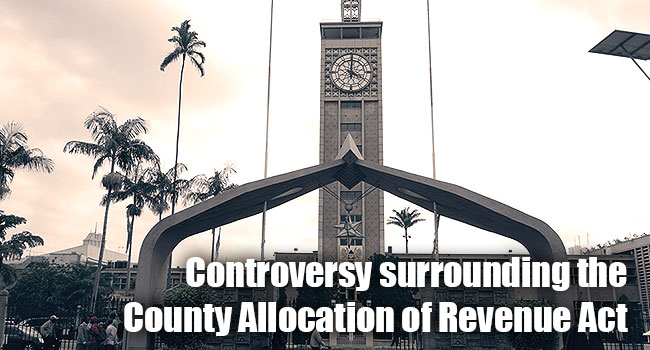The Controversy Surrounding the County Allocation of Revenue Act

President Uhuru Kenyatta's Assent of the County Allocation of Revenue Bill was the first step in setting the stage for County Governments to receive funding and an important stage in aiding the process of Devolution which is a key part of the Constitution 2010. This action by President Kenyatta has been criticized and challenged by not only the Commission for the Implementation of the Constitution chaired by Mr. Charles Nyachae but also the Senate established in Article 93(1) of the Constitution and whose role has been set out in Article 96 of the Constitution of Kenya.
The major challenges advanced towards the then Bill and now Act is the several cases of unconstitutionality from the contents of the Act to the Unconstitutionality in the legislative process that was followed from the legislative drafting to the process of Presidential Assent.
The first issue is that section 7(6) of the County Allocation of Revenue Act which states;
"... Where the allocation of monies to a county results in a county being allocated an amount that is less than the amount commensurate to the cost of the functions devolved to the county, the national government shall allocate part of its share of revenue to provide the additional resources needed..." is contrary to Article 6(2) of the Constitution, which exclusively emphasizes that the National and County levels are distinct and inter-dependent and shall conduct their mutual relations on the basis of consultation and co-operation.
This Section is in contravention of Article 6(1) of the constitution. As it stands it defeats the essence of division of revenue between the two levels of government.
There is a key issue of Constitutional Interpretation in regards to the same section 7(6) of the County Allocation of Revenue Act when read with Article 202(2) of the Constitution.
Article 202 of the Constitution states that, '...County Governments may be given additional allocations from the National Government's share of the Revenue either conditionally or unconditionally...' Section 7(6) of the Act states that, '...where county Governments funds are inadequate the national government shall allocate part of its share of revenue to provide the additional resources needed.
It is important to note the use of the words 'may' in the constitution and 'shall' in the Act. May negates an option while shall negates an obligation. It goes without saying that the Constitution is the supreme law of the Land and therefore it overrides the provision of the Act. However issues such as the intention of Parliament arise especially since one wonders whether Parliament was trying to make the provision mandatory.
Another issue of unconstitutionality arises from the process. The Senate was completely shut out from the Legislative process and their suggestions for amendments and recommendations were not considered. This was clearly unconstitutional considering that Article 94(1) of the constitution invests legislative power in Parliament which consists of both the National Assembly and the Senate. This is also in breach of the Constitution when you consider Article 96(2) which deals with the role of the senate as reads with articles 109-113 which deals with the legislative process and various types of bills. This however then brings out the issue of whether the said Act was a Bill concerning the County Government as provided for in Article 110(1) of the Constitution.
The court in considering this will also pay regard to the fact that this was not a money bill and hence what are the legislative procedures regarding such bills that do not fall under the classification set out in Article 114(3) which deals with Money Bills but fall under the Classification set out in Article 218(1) (b) of the Constitution which made specific provisions for the formation of the County Allocation of Revenue Bill.
The court will be tasked with the duty to determine the following issues;
- The role of the national Assembly vis-à-vis that of the senate in the creation, consideration and enactment of division of Revenue Bills
- The Meaning of a Bill concerning County Government referred to in Article 110 of the Constitution
- The power of the court in giving an opinion on constitutionality of the enactment process of an Act
- The power of the Supreme Court to exercise its advisory mandate in giving an opinion on the Revenue Allocation Act Dispute.
The Provisions of section 7(6) of the Act go outside the framework established by the Constitution and the Public Finance Management Act which is an Act of Parliament to provide for the effective management of public finances by the National and County governments, the oversight responsibility of Parliament and county assemblies, the different responsibilities of government entities and other bodies, and for connected purposes.
The case is set to be heard in court and the Attorney General has requested to be present during the proceeding to give input in regard to the case, which is a matter of great public interest.


